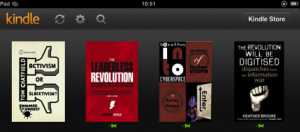Barefoot into a Leaderless, Digitised Revolution
I remember when I first read the name Julian Assange. A narrative book called Underground had just been released into the web as a text file (2001) and he appeared it; as did the place I was working at the time. It was one of those stories that are semi-unputdownable if you have interest in the topic they cover. Becky’s new book – Barefoot into Cyberspace – is another for the digital rights movement. It’s also freely downloadable.
Barefoot into Cyberspace covers her two years at ORG and the year or two after, in which Wikileaks burst onto the scene, and all the detailed history that got us to that point. It’s a faced paced chatty first person narrative, building on and referring to many if the other classic narrative histories of technology over the last 40+ years – and sits very well alongside them. If you care about any of the political, lobbying and traditional political lobbying in the UK, Becky shows some of the battlescars, and how they got that way. That can ultimately lead to burnout from any form of campaigning, as many do, and shows possible paths for recovery. As a book, I suspect it will age well.
For about a month, this blog post felt impossible to write; Becky’s book, while brilliant, left me despondent at the prospect – “we lost the battle” takes time to recover from. Heather widened the focus to the war, but there was still something missing.
Heather Brooke caused the biggest constitutional crisis in our country since we owned her country – she was the only person pushing MPs expenses for years until it exploded. She also has been intricately involved in the Wikileaks, openleaks and similar projects, and was brought in as part of the Guardian team for various projects from Wikileaks. Heather brings her journalistic talents to her involvement in and around the story. She didn’t include any still useful passwords in her book, which meant that it was somewhat unfairly overshadowed by the stories of others.
If Becky talked about burnout; Carne Ross’s first hand seat for much of the pre-invasion time, and there are many decisions that could have led to a different path. While the fallout from that is the raw emotional driver for the book; the vast majority is what, and more importantly, who, is missing in the debates he used to be a part of, what he’s doing about it where he can.
But mostly, it’s about what needs to be done by others. Not those with authority and power, but those who can achieve most by talking to each other. Becky wrote the story from the point of the activisty-NGOs analogised to “watching a group of people trying to decide how to direct rush hour traffic by playing an arcane version of cricket”; Heather wrote the media and true-believer view. But, until reading Carne’s book, there had been nothing from the “inside”; of how Governments are (not) dealing with this; and the very real price that is exacted; and what can be done about that.
Chatting with a couple of other friends who have recently left Public Service (capitalized like that), I suspect we’ll see a few more of those over the next year; and as those people start to network, consider, write, and begin to give “the system” the sort of kicking that Heather administered to MPs.
The books are alike in that parts have the same reason for being written; while Becky’s book goes into detail and that is 90% of the book; Carne leaves detail to the others, but his topic matter lets him. As with The Great Disruption, the second half of the book is looking up and forwards, with optimism and to opportunities for how to build in ways that the processes can’t destroy. I doubt that Carne has been paying much attention to the UK ClimateCamp renewal process; but it has independently gone along very similar lines in a direction that looked to have promise even before I read the book. It is also a substantial part of the ethos of mySociety’s latest project, fixMyTransport.com, and many of the others
Carne focussed on outcomes, and how the process should serve the outcomes; and not the other way round – and processes have a way of self-perpetuating. Covering detail of what went wrong; the shining beacons of what went right were in some ways asides of practice, in different ways at different times, across the globe. Important “lessons from the inside” being insights that are all too rare to those on the outside.
Becky has the cautious insecurity of an “activist”; Heather, the sure footed conviction of a “campaigner”; and Carne the humility that comes from the traumatic transition from Government to the former. And thus, in his book, is the biggest cause for hope and optimism.
But, from all three, a message that achieving what you want to see comes from you; and all three have messages that some would benefit from hearing, which is most interesting depends on your interests, but they’re all worthwhile reading.
Links (in order of publication and reading):
 Disruptive Proactivity
Disruptive Proactivity